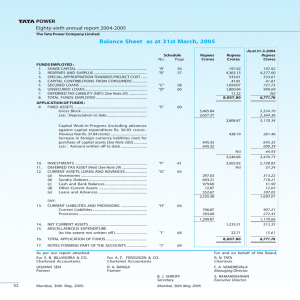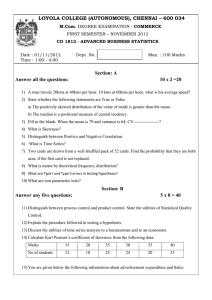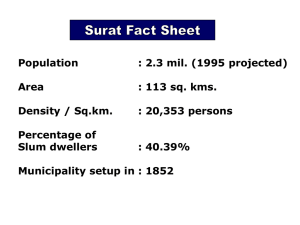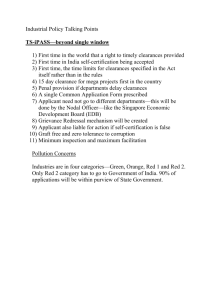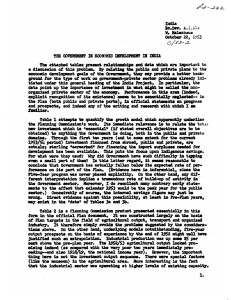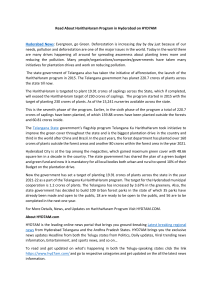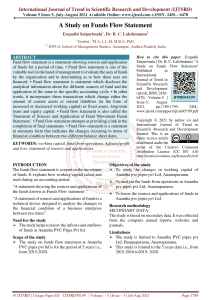The Last Thousand Feet - Economic and Political Weekly
advertisement
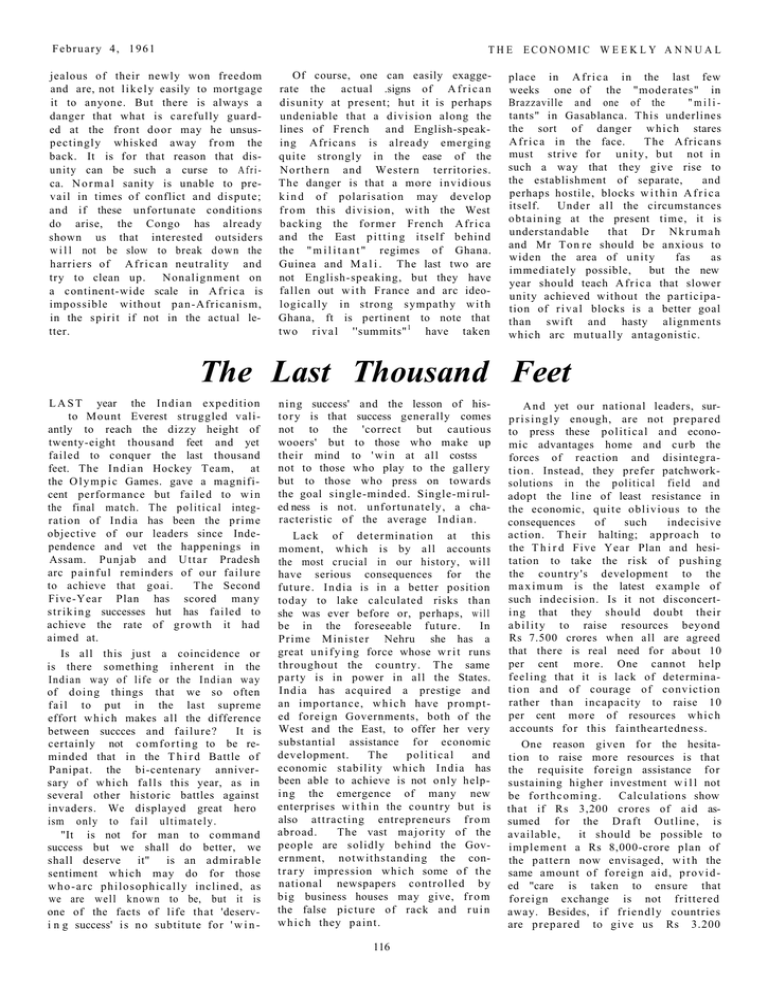
F e b r u a r y 4 , 1961 T H E ECONOMIC W E E K L Y A N N U A L jealous of their newly won freedom and are, not l i k e l y easily to mortgage it to anyone. But there is always a danger that what is carefully guarded at the front door may he unsuspectingly whisked away f r o m the back. It is for that reason that disunity can be such a curse to A f r i ca. N o r m a l sanity is unable to prevail in times of conflict and dispute; and if these unfortunate conditions do arise, the Congo has already shown us that interested outsiders w i l l not be slow to break d o w n the harriers of A f r i c a n neutrality and try to clean up. Nonalignment on a continent-wide scale in A f r i c a is impossible without pan-Africanism, in the spirit if not in the actual letter. Of course, one can easily exaggerate the actual .signs of A f r i c a n disunity at present; hut it is perhaps undeniable that a d i v i s i o n along the lines of French and English-speaking Africans is already emerging quite strongly in the ease of the N o r t h e r n and Western territories. The danger is that a more invidious k i n d of polarisation may develop f r o m this d i v i s i o n , w i t h the West backing the former French A f r i c a and the East p i t t i n g itself behind the " m i l i t a n t " regimes of Ghana. Guinea and M a l i . The last two are not English-speaking, but they have fallen out w i t h France and arc ideologically in strong sympathy w i t h Ghana, ft is pertinent to note that two r i v a l ''summits" 1 have taken place in A f r i c a in the last few weeks one of the "moderates" in Brazzaville and one of the "militants" in Gasablanca. T h i s underlines the sort of danger w h i c h stares A f r i c a in the face. The Africans must strive for u n i t y , but not in such a way that they give rise to the establishment of separate, and perhaps hostile, blocks w i t h i n A f r i c a itself. Under a l l the circumstances o b t a i n i n g at the present time, it is understandable that Dr N k r u m a h and Mr T o n re should be anxious to widen the area of u n i t y fas as immediately possible, but the new year should teach A f r i c a that slower unity achieved without the participation of r i v a l blocks is a better goal than swift and hasty alignments which arc m u t u a l l y antagonistic. The Last Thousand Feet L A S T year the I n d i a n expedition to Mount Everest struggled valiantly to reach the dizzy height of twenty-eight thousand feet and yet failed to conquer the last thousand feet. The I n d i a n Hockey Team, at the O l y m p i c Games. gave a magnificent performance but f a i l e d to w i n the final match. The p o l i t i c a l integration of India has been the prime objective of our leaders since Independence and vet the happenings in Assam. Punjab and U t t a r Pradesh arc p a i n f u l reminders of our failure to achieve that goai. The Second Five-Year Plan has scored many s t r i k i n g successes hut has failed to achieve the rate of growth it had aimed at. Is all this just a coincidence or is there something inherent in the Indian way of life or the I n d i a n way of d o i n g things that we so often f a i l to put in the last supreme effort w h i c h makes all the difference between succces and failure? It is certainly not c o m f o r t i n g to be reminded that in the T h i r d Battle of Panipat. the bi-centenary anniversary of which falls this year, as in several other historic battles against invaders. We displayed great hero ism only to f a i l u l t i m a t e l y . "It is not for man to command success but we shall do better, we shall deserve it" is an admirable sentiment which may do for those w h o - a r c p h i l o s o p h i c a l l y inclined, as we are well known to be, but it is one of the facts of life that 'deservi n g success' is no subtitute for ' w i n - n i n g success' and the lesson of hist o r y is that success generally comes not to the 'correct but cautious wooers' but to those who make up their mind to ' w i n at all costss not to those who play to the gallery but to those who press on towards the goal single-minded. Single-mi ruled ness is not. unfortunately, a characteristic of the average I n d i a n . Lack of determination at this moment, which is by all accounts the most crucial in our history, w i l l have serious consequences for the future. I n d i a is in a better position today to lake calculated risks than she was ever before or, perhaps, w i l l be in the foreseeable future. In P r i m e M i n i s t e r Nehru she has a great u n i f y i n g force whose w r i t runs throughout the country. The same party is in power in all the States. India has acquired a prestige and an importance, w h i c h have prompted foreign Governments, both of the West and the East, to offer her very substantial assistance for economic development. The political and economic stability which I n d i a has been able to achieve is not only helpi n g the emergence of many new enterprises w i t h i n the country but is also attracting entrepreneurs f r o m abroad. The vast m a j o r i t y of the people are solidly behind the Government, notwithstanding the cont r a r y impression which some of the national newspapers controlled by big business houses may give, f r o m the false picture of rack and r u i n w h i c h they paint. 116 A n d yet our national leaders, surp r i s i n g l y enough, are not prepared to press these political and economic advantages home and curb the forces of reaction and disintegrat i o n . Instead, they prefer patchworksolutions in the political field and adopt the line of least resistance in the economic, quite oblivious to the consequences of such indecisive action. T h e i r halting; approach to the T h i r d Five Year Plan and hesitation to take the risk of pushing the country's development to the m a x i m u m is the latest example of such indecision. Is it not disconcerti n g that they should doubt their a b i l i t y to raise resources beyond Rs 7.500 crores when all are agreed that there is real need for about 10 per cent more. One cannot help feeling that it is lack of determination and of courage of conviction rather than incapacity to raise 10 per cent more of resources w h i c h accounts for this faintheartedness. One reason given for the hesitation to raise more resources is that the requisite foreign assistance for sustaining higher investment w i l l not be f o r t h c o m i n g . Calculations show that if Rs 3,200 crores of a i d assumed for the D r a f t Outline, is available, it should be possible to implement a Rs 8,000-crore plan of the pattern now envisaged, w i t h the same amount of foreign a i d , p r o v i d ed "care is taken to ensure that foreign exchange is not frittered away. Besides, if f r i e n d l y countries are prepared to give us Rs 3.200 THE ECONOMICAL WEEKLY F e b r u a r y 4, 1961 9 croree, it should not be too difficult to persuade them to give another Rs 100 or 200 crores, if that is a l l that stands between us and the highest attainable rate o f g r o w t h . The argument that a bigger p l a n cannot be c a r r i e d out because of f o r e i g n exchange shortage must, therefore, be treated as a piece of specious pleading. The f o r e i g n exchange position on the eve of the T h i r d Plan, it is comp l a i n e d by some, is very much worse than what it was on the eve of the Second Plan- If one o n l y looks to the sterling balances, it may appear to be so. But if the foreign exchange in sight, both owned and b o r r o w e d , on the eve of the Second Plan is compared w i t h that on the eve of the T h i r d Plan, it w i l l be seen that we have now substantially larger foreign exchange resources than we. had five years ago. At the t i m e of the Second Plan, foreign countries w i r e quite unprepared to meet our massive requirements— there was no ' a i d I n d i a club' then —and yet we got much larger aid than we had planned for. Now that they are prepared and even organised to give us assistance on a large scale and are also appraised of our needs f a i r l y well, it is surely not unrealistic to assume that aid of the order of Rs 11200 or 3.400 crores should be f o r t h c o m i n g . Neither should it be difficult to increase our exports by another 10 per cent a year, if we go about it in a determined way, Far f r o m foreign exchange h o l d i n g up development, j u d g i n g f r o m the inadequacy of the preparations made so far. I n d i a may not be able to utilise the a i d she may get in the T h i r d P l a n period. The advocates of a. smaller plan also contend that it would not be possible for the present Government to raise the requisite internal resources for a bigger p l a n w i t h o u t losing the elections or w i t h o u t expoking the country to r u i n . It is difficult to see how the Congress can lose the next elections. A l l the opposition parlies. Communists. P S P, Jan Sangh and the Swatantra, are m u c h weaker today than in the past, either on account of their own mistakes or as a result of certain combination of events. Moreover, the first two are themselves pleadi n g for a b o l d p l a n . In the c i r c u m stances, if any party is in a posit i o n to take seemingly u n p o p u l a r decisions f o r raising larger resour- ces f o r the Plan a n d yet w i n the elections w i t h a decisive m a j o r i t y , it i3 the Congress p a r t y . W h y should the Congress w o r r y about the elections today when Pandit N e h r u is still at the helm of affairs, when product i o n has been going up both in agriculture and industry and when the intransigence of China and the p o p u l a r r e v o l u t i o n against the activities of fissiparous sections and groups w i t h i n the country have united the nation behind Pandit Nehru as never before The argument that internal resources cannot, be raised by another 10 per cent or so over what has been assumed in the figure of Us 7,500 crores, seems to be i l l grounded. This w i l l only mean pushi n g up the rate of saving to 13 or 14 per cent as compared w i t h 20 to 25 per cent saved in so many other countries today. We should give up all our talk of sacrifice and austerity, determination to achieve self sustained g r o w t h and presumption to become a great nation, if we feel that we cannot step up the rate of saving even to 13 per cent. A simple comparison of the performance of I n d i a in m o b i l i s i n g savings w i t h that of Japan or China should really make us blush. A p a r t from a n y t h i n g else, if the value of land had risen by 20 to 25 times in a metropolitan area l i k e Delhi and by 40 to 50 times in some new indust r i a l towns in the last 10 years, it should be possible for Government to raise a large p r o p o r t i o n of the a d d i t i o n a l resources required from land acquisition and sale alone. W i t h a l l the f l a u n t i n g o f wealth t i n t one sees in I n d i a n cities, is it really to be believed that another Rs 300 to 400 crores of taxation w i l l i m p e r i l the country? W i t h all the bureaucratic red-tape in our organisations for p r o m o t i n g savings ( i n c l u d i n g the Postal Savings B a n k ) , does it stand to reason that we cannot raise Rs 200 or 300 crores more, if we take steps to i m p r o v e 117 the efficiency of these agencies? A n d finally, w i t h all the uneconomic price policies in p u b l i c enterprises, can one seriously rule out the poss i b i l i t y of securing an additional R.s 100 or 200 crores f r o m the surplus of these enterprises? It is not lack of resources but of determination to lap the reources that is preventing the country f r o m accepting straightway a financial plan of the order of Rs 8,000 crores ( w i t h a supplementary plan of another Rs 100 crores) w h i c h , according to the Planning Commission, is the absolute m i n i m u m required by the country. A n d it is quite obvious that the inevitable result of this over-cautions policy of a i m i n g low rather than a i m i n g h i g h , as advocated by Pandit Nehru, w i l l be i n adequate preparation and insufficient effort and hence incapacity to reach the g o a l . One cannot help feeling that the lack of determination and s p i r i t of adventure that h i s dogged India's destiny in the past is also l i k e l y to mar her future. As a nation, we are perhaps apt to put too much prem i u m on caution and forget that great things have been achieved in the w o r l d not by the overcautious and the prudent but by the hold, by those who had the courage to take calculated risks and readiness to take the fullest advantage of every o p p o r t u n i t y that presented itself. If I n d i a fails to make the desired progress in the next five years, it w i l l not be because of any lack of capacity in the people or because the forces ranged against her were overwhelming, ft w i l l be due solely to want of resolution and firmness of purposes, to that f a i l u r e of s p i r i t at the psychological moment that madn our forbears lose the battle of Panipat 200 years ago and that benumbed our expendition to M o u n t Everest when w i t h i n only a thousand feel of the summit. We have to key up all our energies for that final, last spurt- THE F e b r u a r y 4, 1961 118 ECONOMIC WEEKLY ANNUAL
